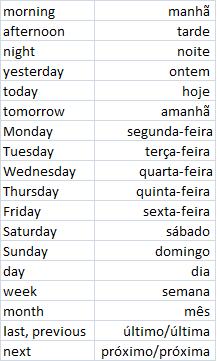In Portuguese, we tend to use days and times of the day in different orders and such than in English.
For example, in English you would say, “I had lunch late in the afternoon on Wednesday, at 3 o’clock.” In Portuguese, the same sentence would be, “Eu almocei tarde na quarta-feira, às 3 horas da tarde.”
Today we’re going to go over some of the vocabulary and examples on how to use words related to days and times of the day in Portuguese.

Now for a few notes and tricks:
– Note that days of the week in Portuguese are in lowercase as opposed to uppercase in English.
– A trick to remember days of the week is to think of them as having a number order. If Sunday is the first day of the week, and Monday is the second, therefore Monday is, “segunda,” (second) and Tuesday is “terça,” (third), and so on until you get to “sexta,” (sixth) on Friday. If you need to refresh your ordinals, check out this post on Portuguese Ordinal Numbers and their Pronunciation.
– When you do something “in the morning/afternoon/night,” in Portuguese you would put a “de,” in front of it. For example, “Eu tomo café de manhã,” or “Eu saio para dançar de noite.”
– When saying the exact date of something with day included, you do so in this order, “No dia+date+month+de+year+na+day+da+period.” Ex. – Eu nasci dia 14 de novembro de 1985 na quinta-feira, or Minha consulta médica é dia 07 de julho na quarta-feira da semana que vem.
What are some of your other doubts about days and time of the day in Portuguese?






Comments:
Lila:
Great post!
My questions are:
How do you say tomorrow but specify in the morning– Amanha de manha?
Also, you mentioned “de manha/tarde/noite” but can “na manha/tarde/noite” be used as well? For example, if someone asks “Quando ele vai chegar amanha?” (when is he going to arrive tomorrow?) Is it correct to respond “na manha” (in the morning)? Similarly, is there a way to specify you don’t know the exact time only the period of the day for example: ‘sometime at night’ or ‘sometime in the morning’? For example, if someone asks when you will leave your house but you don’t have a time in mind, how do you say ‘sometime in the afternoon ‘ ?
Lastly, when do you use DE manha/tarde/noite as opposed to DA manha/tarde/noite?
polyana:
hi lila!!
yes, tomorrow morning would be “amanhã de manhã.”
and “de,” is the correct word to use – you would say, “Ela chega de manhã” ou simply, “de manhã” or “de tarde.” the only exception here is with noite. You could say “de noite,” but also, “a noite”
As for not specifying a time, you can use the above as well as “a” before “tarde,” as well if you want to say something is during the afternoon – such as, “vamos pro parque a tarde?”
you use “da” when specifying a time. “eu acordo as 8 horas da manhã” vs, “amanhã trabalho de manhã”
does this help?
Lila:
Thanks a lot!